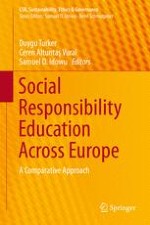
2016 | OriginalPaper | Chapter
Social Responsibility Education in Turkey
Authors : Huriye Toker, Duygu Turker, Ceren Altuntaş Vural
Published in: Social Responsibility Education Across Europe
Publisher: Springer International Publishing
Activate our intelligent search to find suitable subject content or patents.
Select sections of text to find matching patents with Artificial Intelligence. powered by
Select sections of text to find additional relevant content using AI-assisted search. powered by